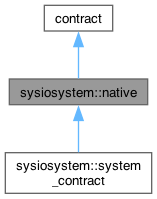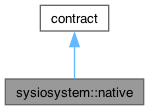#include <native.hpp>


Public Types | |
| using | newaccount_action = sysio::action_wrapper<"newaccount"_n, &native::newaccount> |
| using | updateauth_action = sysio::action_wrapper<"updateauth"_n, &native::updateauth> |
| using | deleteauth_action = sysio::action_wrapper<"deleteauth"_n, &native::deleteauth> |
| using | linkauth_action = sysio::action_wrapper<"linkauth"_n, &native::linkauth> |
| using | unlinkauth_action = sysio::action_wrapper<"unlinkauth"_n, &native::unlinkauth> |
| using | canceldelay_action = sysio::action_wrapper<"canceldelay"_n, &native::canceldelay> |
| using | setcode_action = sysio::action_wrapper<"setcode"_n, &native::setcode> |
| using | setabi_action = sysio::action_wrapper<"setabi"_n, &native::setabi> |
Public Member Functions | |
| void | newaccount (const name &creator, const name &name, ignore< authority > owner, ignore< authority > active) |
| void | updateauth (name account, name permission, name parent, authority auth, binary_extension< name > authorized_by) |
| void | deleteauth (name account, name permission, binary_extension< name > authorized_by) |
| void | linkauth (name account, name code, name type, name requirement, binary_extension< name > authorized_by) |
| void | unlinkauth (name account, name code, name type, binary_extension< name > authorized_by) |
| void | canceldelay (ignore< permission_level > canceling_auth, ignore< checksum256 > trx_id) |
| void | onerror (ignore< uint128_t > sender_id, ignore< std::vector< char > > sent_trx) |
| void | setabi (const name &account, const std::vector< char > &abi, const binary_extension< std::string > &memo) |
| void | setcode (const name &account, uint8_t vmtype, uint8_t vmversion, const std::vector< char > &code, const binary_extension< std::string > &memo) |
Detailed Description
The EOSIO core native contract that governs authorization and contracts' abi.
Definition at line 128 of file native.hpp.
Member Typedef Documentation
◆ canceldelay_action
| using sysiosystem::native::canceldelay_action = sysio::action_wrapper<"canceldelay"_n, &native::canceldelay> |
Definition at line 318 of file native.hpp.
◆ deleteauth_action
| using sysiosystem::native::deleteauth_action = sysio::action_wrapper<"deleteauth"_n, &native::deleteauth> |
Definition at line 315 of file native.hpp.
◆ linkauth_action
| using sysiosystem::native::linkauth_action = sysio::action_wrapper<"linkauth"_n, &native::linkauth> |
Definition at line 316 of file native.hpp.
◆ newaccount_action
| using sysiosystem::native::newaccount_action = sysio::action_wrapper<"newaccount"_n, &native::newaccount> |
Definition at line 313 of file native.hpp.
◆ setabi_action
| using sysiosystem::native::setabi_action = sysio::action_wrapper<"setabi"_n, &native::setabi> |
Definition at line 320 of file native.hpp.
◆ setcode_action
| using sysiosystem::native::setcode_action = sysio::action_wrapper<"setcode"_n, &native::setcode> |
Definition at line 319 of file native.hpp.
◆ unlinkauth_action
| using sysiosystem::native::unlinkauth_action = sysio::action_wrapper<"unlinkauth"_n, &native::unlinkauth> |
Definition at line 317 of file native.hpp.
◆ updateauth_action
| using sysiosystem::native::updateauth_action = sysio::action_wrapper<"updateauth"_n, &native::updateauth> |
Definition at line 314 of file native.hpp.
Member Function Documentation
◆ canceldelay()
|
inline |
Cancel delay action cancels a deferred transaction.
- Parameters
-
canceling_auth - the permission that authorizes this action, trx_id - the deferred transaction id to be cancelled.
Definition at line 277 of file native.hpp.
◆ deleteauth()
|
inline |
Delete authorization action deletes the authorization for an account's permission.
This contract enforces additional rules:
- If authorized_by is present and not "", then the contract does a require_auth2(account, authorized_by).
- If the account has opted into limitauthchg, then authorized_by must be present and not "".
- If the account has opted into limitauthchg, and allow_perms is not empty, then authorized_by must be in the array.
- If the account has opted into limitauthchg, and disallow_perms is not empty, then authorized_by must not be in the array.
- Parameters
-
account - the account for which the permission authorization is deleted, permission - the permission name been deleted. authorized_by - the permission which is authorizing this change
Definition at line 199 of file native.hpp.

◆ linkauth()
|
inline |
Link authorization action assigns a specific action from a contract to a permission you have created. Five system actions can not be linked updateauth, deleteauth, linkauth, unlinkauth, and canceldelay. This is useful because when doing authorization checks, the EOSIO based blockchain starts with the action needed to be authorized (and the contract belonging to), and looks up which permission is needed to pass authorization validation. If a link is set, that permission is used for authorization validation otherwise then active is the default, with the exception of sysio.any. sysio.any is an implicit permission which exists on every account; you can link actions to sysio.any and that will make it so linked actions are accessible to any permissions defined for the account.
This contract enforces additional rules:
- If authorized_by is present and not "", then the contract does a require_auth2(account, authorized_by).
- If the account has opted into limitauthchg, then authorized_by must be present and not "".
- If the account has opted into limitauthchg, and allow_perms is not empty, then authorized_by must be in the array.
- If the account has opted into limitauthchg, and disallow_perms is not empty, then authorized_by must not be in the array.
- Parameters
-
account - the permission's owner to be linked and the payer of the RAM needed to store this link, code - the owner of the action to be linked, type - the action to be linked, requirement - the permission to be linked. authorized_by - the permission which is authorizing this change
Definition at line 235 of file native.hpp.

◆ newaccount()
| void sysiosystem::native::newaccount | ( | const name & | creator, |
| const name & | new_account_name, | ||
| ignore< authority > | owner, | ||
| ignore< authority > | active ) |
These actions map one-on-one with the ones defined in core layer of EOSIO, that's where their implementation actually is done. They are present here only so they can show up in the abi file and thus user can send them to this contract, but they have no specific implementation at this contract level, they will execute the implementation at the core layer and nothing else. New account action is called after a new account is created. This code enforces resource-limits rules for new accounts as well as new account naming conventions.
Called after a new account is created. This code enforces resource-limits rules for new accounts as well as new account naming conventions.
Account names containing '.' symbols must have a suffix equal to the name of the creator. This allows users who buy a premium name (shorter than 12 characters with no dots) to be the only ones who can create accounts with the creator's name as a suffix.
Definition at line 435 of file sysio.system.cpp.

◆ onerror()
| void sysiosystem::native::onerror | ( | ignore< uint128_t > | sender_id, |
| ignore< std::vector< char > > | sent_trx ) |
On error action, notification of this action is delivered to the sender of a deferred transaction when an objective error occurs while executing the deferred transaction. This action is not meant to be called directly.
- Parameters
-
sender_id - the id for the deferred transaction chosen by the sender, sent_trx - the deferred transaction that failed.
Definition at line 7 of file native.cpp.
◆ setabi()
| void sysiosystem::native::setabi | ( | const name & | account, |
| const std::vector< char > & | abi, | ||
| const binary_extension< std::string > & | memo ) |
Set abi action sets the contract abi for an account.
- Parameters
-
account - the account for which to set the contract abi. abi - the abi content to be set, in the form of a blob binary. memo - may be omitted
Definition at line 474 of file sysio.system.cpp.
◆ setcode()
|
inline |
Set code action sets the contract code for an account.
- Parameters
-
account - the account for which to set the contract code. vmtype - reserved, set it to zero. vmversion - reserved, set it to zero. code - the code content to be set, in the form of a blob binary.. memo - may be omitted
Definition at line 310 of file native.hpp.
◆ unlinkauth()
|
inline |
Unlink authorization action it's doing the reverse of linkauth action, by unlinking the given action.
This contract enforces additional rules:
- If authorized_by is present and not "", then the contract does a require_auth2(account, authorized_by).
- If the account has opted into limitauthchg, then authorized_by must be present and not "".
- If the account has opted into limitauthchg, and allow_perms is not empty, then authorized_by must be in the array.
- If the account has opted into limitauthchg, and disallow_perms is not empty, then authorized_by must not be in the array.
- Parameters
-
account - the owner of the permission to be unlinked and the receiver of the freed RAM, code - the owner of the action to be unlinked, type - the action to be unlinked. authorized_by - the permission which is authorizing this change
Definition at line 263 of file native.hpp.

◆ updateauth()
|
inline |
Update authorization action updates permission for an account.
This contract enforces additional rules:
- If authorized_by is present and not "", then the contract does a require_auth2(account, authorized_by).
- If the account has opted into limitauthchg, then authorized_by must be present and not "".
- If the account has opted into limitauthchg, and allow_perms is not empty, then authorized_by must be in the array.
- If the account has opted into limitauthchg, and disallow_perms is not empty, then authorized_by must not be in the array.
- Parameters
-
account - the account for which the permission is updated permission - the permission name which is updated parent - the parent of the permission which is updated auth - the json describing the permission authorization authorized_by - the permission which is authorizing this change
Definition at line 172 of file native.hpp.

The documentation for this class was generated from the following files:
- /Users/svetlasyrimis/Desktop/wire-network/WN-org/wire-system-contracts/contracts/sysio.system/include/sysio.system/native.hpp
- /Users/svetlasyrimis/Desktop/wire-network/WN-org/wire-system-contracts/contracts/sysio.system/src/native.cpp
- /Users/svetlasyrimis/Desktop/wire-network/WN-org/wire-system-contracts/contracts/sysio.system/src/sysio.system.cpp